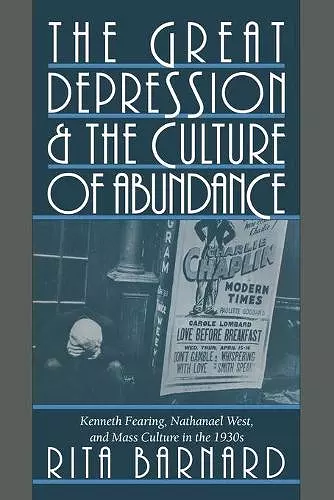The Great Depression and the Culture of Abundance
Kenneth Fearing, Nathanael West, and Mass Culture in the 1930s
Format:Paperback
Publisher:Cambridge University Press
Published:9th Jan '09
Currently unavailable, and unfortunately no date known when it will be back
This paperback is available in another edition too:
- Hardback£95.99(9780521450348)

Examines the response of American leftist writers from the 1930s to the rise of mass culture.
Examines the response of American leftist writers from the 1930s to the rise of mass culture, and to the continued propagation of the values of consumerism during the Depression. It traces in the work of Kenneth Fearing and Nathaniel West certain theoretical positions associated with the Frankfurt school (especially Walter Benjamin) and with contemporary theorists of postmodernism.Two contradictory, or apparently contradictory, pairs of terms - depression and abundance, and literature and mass culture - make up the framework of this study in 1930s culture. Rita Barnard suggests that despite the painful national experience of scarcity and poverty, one can detect in the culture of the American thirties the now familiar outlines of an image-mediated, consumer society. She argues that the hierarchical opposition between 'high art' and 'mass culture' was powerfully contested in cultural productions of the depression era: as book clubs, radio, popular exhibitions, star conductors such as Toscanini and many other vehicles brought high culture to millions of people. In the meantime, writers with 'serious' literary interests borrowed from the discourse of the media in their writing. The central figures of this study emerge as pre-eminent – and in some sense prophetic – figures: their poetry and prose illuminate emergent cultural forces that have since attained new stature in our post-modern world. Despite their sharp and often prescient social critique, they are not to be mistaken for elitists, they recognised at once the deceit and the promise of our emergent culture of abundance.
"Barnard's analysis helps explain why writers such as Benjamin and West should reappear now as significant figures for another generation of intellectuals. The mark of a good critic is that she makes you want to go directly to the text. Barnard reminded me of what a great poet Fearing was as she seconded my return trip to West; I expect this study to spark a Fearing revival....Like the shock of finishing a plate of potato salad to find Salamina's hairy legs sprouting from the prairie, these 1930s writings draw Marxist critiques of commodity fetishism from the very icons of capitalist consumption. And make you ask fir seconds. So does Rita Barnard." Paula Rabinowitz, Novel
"Rita Barnard's The Great Depression and the Culture of Abundance offers a rich and insightful study of the Depression as seen through the work of two of its most important, albeit insufficiently recognized, cultural observers: Kenneth Fearing and Nathanael West." American Literature
"This book will force scholars to rethink the meaning of mass culture in the Depression years....Barnard takes a fresh approach....This is a brilliant book." Robbie Lieberman, AmericanHistorical Review
ISBN: 9780521102223
Dimensions: 229mm x 152mm x 16mm
Weight: 420g
284 pages